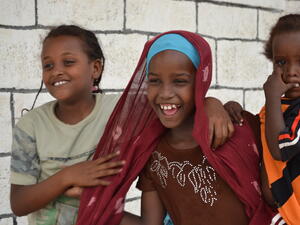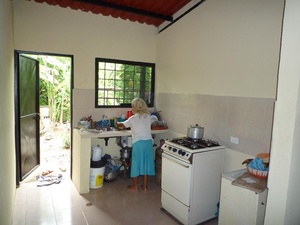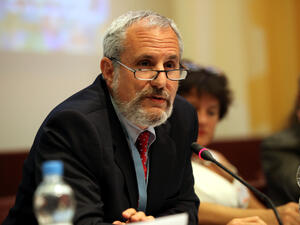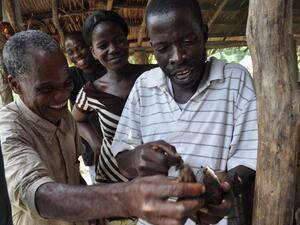Africa's legislators promise to promote refugee protection
Africa's legislators promise to promote refugee protection

Angolan refugees constructing new homes in Zambia, where local integration is promoted in some areas.
COTONOU, Benin, June 14 (UNHCR) - In an effort to better protect refugees and get states to effectively implement the international treaties they have signed, the UN refugee agency has enlisted African legislators to promote refugee protection and solutions to their plight.
The scale of Africa's displacement crisis is huge, despite significant voluntary return movements in recent years to a number of countries, including Sierra Leone, Angola, Rwanda, Burundi and Somalia. Six of the world's major refugee-producing countries are in Africa. Four million Africans live as refugees in a foreign land and another 13 million uprooted people live as internal exiles outside their home areas due to wars and brutal human rights abuses.
UNHCR and African parliamentarians have joined hands to promote solutions and better understanding among members of parliament and the general public about the plight of refugees and ways to better protect them.
In cooperation with the African Parliamentary Union and Benin's National Assembly, the UN refugee agency and the Inter-Parliamentary Union organised a conference in early June to look at durable solutions for Africa's refugees and ways to raise the profile of its millions of exiles.
"The history of humanitarian crises shows that the forced displacement of populations can only be avoided or contained if the international community works together with determination to resolve conflicts," Kamel Morjane, UNHCR's Assistant High Commissioner told the legislators in his keynote address to the conference, which was opened by Benin's President, Mathieu Kerekou.
The conference, attended by some 150 legislators from 26 countries, marked the first time the UN refugee agency has reached out to African parliamentarians in a systematic way to sensitise them to refugee problems and encourage them to find solutions.
UNHCR believes that Africa's legislators can help to spotlight local needs facing refugee communities and educate host communities on how they can assist refugees, by improving attitudes and offering their friendship towards exiles living in their midst.
"As opinion leaders and decision makers, parliamentarians can help demystify refugees, disentangle them from confused public debate about terrorists, fighters and illegal immigrants, and thereby encourage greater tolerance and more informed decision-making," Erika Feller, who oversees refugee protection for UNHCR, told the law makers.
The refugee agency wants Africa's legislators to actively participate in discussions on refugee issues on the continent, and feel ownership for the initiatives meant to improve attitudes towards refugees.
The most significant outcome of the Cotonou conference was a declaration affirming that both the 1951 Geneva Convention on refugees and the 1969 Organisation of Africa Unity Convention remain very relevant. The declaration also stated that refugee protection includes "the ability to lead a meaningful and dignified life while in exile; and that this requires the empowerment of refugees to attain self-reliance."
Attached to the declaration is a parliamentary programme of action indicating how Africa's legislators can better protect refugees and be instrumental in finding solutions to their plight.
"Beyond lofty aspirations, the programme of action includes very concrete measures that parliamentarians can and must take to fulfil their role as elected officials," said UNHCR's José Riera, who helped organise the meeting.
"Things as simple as visiting refugee camps, convening parliamentary hearings and speaking to ministers will help to ensure that parliamentarians take a more active role in defining refugee policy and taking informed decisions about refugee policy at the national level," Riera stressed.
At a time when peace initiatives are taking hold on the African continent, heralding the possibility that two-thirds of Africa's refugees may return home over the next four years, UNHCR believes that the meeting took place at an opportune time.
"As democracy takes hold in Africa, it is necessary for UNHCR to partner with all elements of civil society, particularly parliamentarians, since they represent their local constituencies," Riera declared. "It is no longer enough to speak exclusively to the minister responsible for refugees, or to the executive branch, we must reach out to the wider public."
Refugees arrive in their host countries with abilities and skills that may all too often go to waste unless they are actively integrated into the host community. By encouraging local integration of refugees and self-reliance projects, such as those employed with success in Zambia and Uganda, as well as throughout many of West Africa's refugee-affected areas, local residents can also benefit from the arrival and presence of refugees.
Further objectives contained in a plan of action prepared at the meeting include increasing the public's awareness of international refugee law by getting parliamentarians to actively promote refugee rights, human rights and humanitarian law. UNHCR can also help governments to improve responses to mass influxes and pursuing durable solutions for refugee groups.









